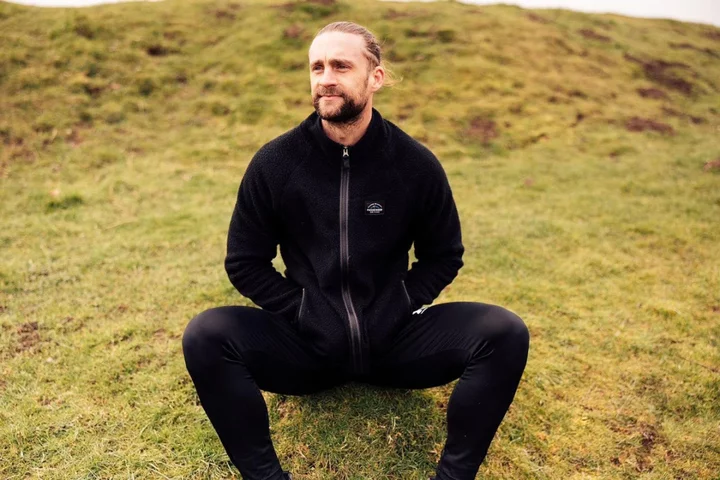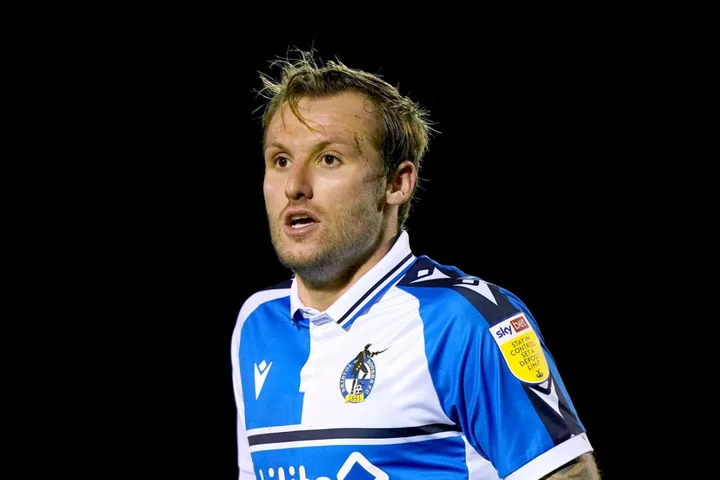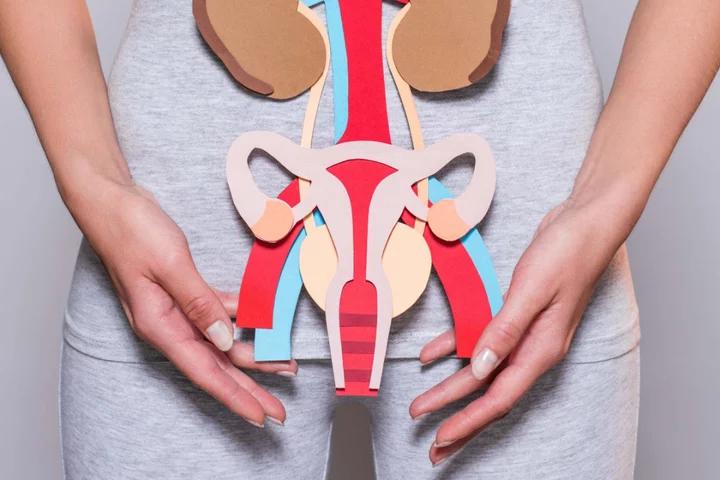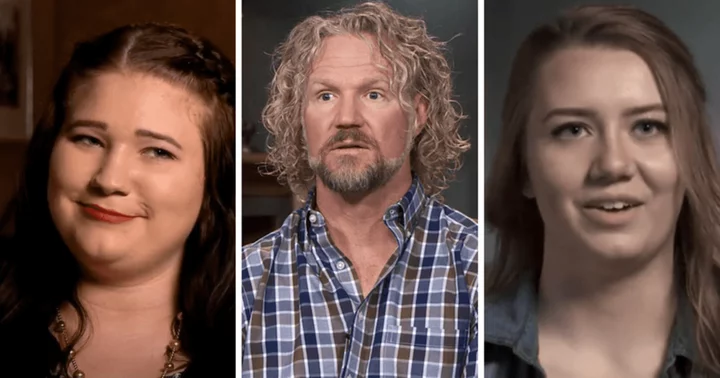
Fraser Franks set for op – four years after heart problem ended football career
Former Newport defender Fraser Franks faced a difficult “grieving process” when a heart problem cut short his football career at the age of 28. But four years on, as he prepares for surgery that will ultimately save his life, he is “grateful” the condition was picked up early – as many people are not even aware they are at risk. “I’ll be having a mechanical valve fitted and work done on my aorta,” Franks, now 32, told the PA news agency. His surgery is set for September 4. “It is a big operation and I’ll be in hospital for about 10 days. And the recovery after, I won’t be able to lift anything, even a bag of shopping, for two to three months. “With a four-year-old daughter, that’s going to be difficult for me and her,” added Franks, who shares daughter Nellie with his wife, former S Club 8 singer Stacey McClean. “It’s been a lot to get my head around. There will be certain things I can’t do afterwards and a lot of lifestyle adjustments, but I’m really happy and content with it. “I’m grateful that this has been found and that there’s a solution for me, where unfortunately a lot of people haven’t got that. “I’ve had conversations with cardiologists and surgeons (who’ve said) this is going to save my life, I probably wouldn’t live much longer with the heart I’ve currently got. So I’m really grateful for that and it’s only through playing for a professional football club that this was picked up.” Franks was born with a bicuspid valve – meaning his aortic valve – which helps control blood flow in the heart – had two cusps (flaps) instead of the usual three. The condition is believed to affect around one in every 100 people, but it often does not cause symptoms and only becomes serious if the valve begins to leak or develops severe narrowing (aortic stenosis), which is what has happened in Franks’ case. A routine medical at the age of 16 first picked up the defect. Franks, who signed with Chelsea at age eight, had always been fit and healthy, but when he signed with Brentford at 16, like all players joining pro clubs, he was given a heart scan. Further investigations revealed the bicuspid valve, but because it was not causing problems, he was given the green light to continue as normal. Franks carried on, trying not to give it too much thought – until at 28, he suddenly started feeling unwell after a game and was rushed to hospital the next day, worried he was having a heart attack. “I wasn’t having a heart attack or anything like that, but I contracted an infection. While I was in there though, I told them I’d had this heart issue when I was 16, so they scanned me and saw the condition had worsened,” he recalled. “I’d developed aortic stenosis and the valve was leaking a lot more. Then it was deemed unsafe for me to carry on playing football, so I had to stop playing there and then.” London-born Franks has teamed up with the British Heart Foundation for their September Spotlight campaign, which aims to shine a spotlight on hidden heart conditions. His story highlights how heart problems can potentially affect anyone – including those who are young and seemingly very fit and healthy. Even when symptoms are mild or barely noticeable, undetected issues could become serious and even life-threatening, which is why research and awareness is so vital. Plus, as Franks has experienced, there are complex layers and emotional challenges to living with a hidden heart condition too. Being forced to suddenly retire early when he’d previously felt fine – and still looked well on the outside – was tough. “Ever since age eight, I’d been known as ‘the footballer’. It had been my whole identity, so to retire at 28 out of the blue was difficult,” Franks explained. “I think I kidded myself in the first six months, where I was saying, ‘Yeah I’m fine, I’m enjoying retirement and all that good stuff’. But I was really struggling and drinking heavily. “I reached out and got some help and had to do a lot of therapy. It really is a grieving process and I had to figure out who I was and what I enjoyed away from being ‘the athlete’. I do a lot of work around addiction and alcohol now, because I really struggled with those things Fraser Franks “And I didn’t play at the top level, so I didn’t have savings in the bank – I had to pretty much get to work straight away and earn a living. My wife was heavily pregnant then too, so there was a lot of stress and overwhelm at that period.” Yoga and meditation also proved a huge help in coming to terms with everything and Franks has since found a new sense of purpose, channelling his experiences into helping others. He added: “I do a lot of work around addiction and alcohol now, because I really struggled with those things. “That’s become a big part of what I do now, helping people who want to transition away from sport and working with young athletes on addiction and mental health.” He took up yoga as a gentle form of exercise when doctors told him strenuous sport was too risky. “I just completely fell in love with it,” Franks added. “I’ve found a real passion for it. It’s actually a goal of mine now – it’s going to be something I’ll be thinking about when I’m in hospital – when I’m healed, I want to go to India or Bali and actually earn a qualification and get trained as a yoga teacher. “Instead of focusing on all the things I’m unable to do, that’s something I will be able to do. That brings me a lot of comfort.” :: This September, the BHF is shining a spotlight on hidden heart conditions and urging everyone to get involved by supporting the charity however they can, with stories, stuff, time or money. Visit spotlighton.bhf.org.uk Read More Charity boss speaks out over ‘traumatic’ encounter with royal aide Ukraine war’s heaviest fight rages in east - follow live Brighton to face European giants Ajax and Marseille in Europa League Liverpool turn down £150m offer for Mohamed Salah from Al-Ittihad Man City seal Matheus Nunes deal as Cole Palmer leaves and Man Utd sign keeper
2023-09-01 20:59

US woman sets record for world's longest female mullet
Tami Manis is officially all business at the front and party in the back after her mullet, measuring 5 feet 8 inches (nearly 173 centimeters), was confirmed as the longest female one in the world.
2023-09-01 19:59

Paris says au revoir to rental e-scooters
The ban comes after a vote in the French capital - but is it democracy in action?
2023-09-01 19:21

‘Best possible news’ – Nick Anderton reveals scans show no sign of active cancer
Former Bristol Rovers defender Nick Anderton has revealed he is no longer actively suffering from bone cancer. The 27-year-old has undergone 28 weeks of chemotherapy and had his knee and part of his femur cut out after being diagnosed with the disease in July 2022. He retired from football in April of this year and his latest scans have shown the cancer is no longer active. Anderton said in a social media post: “Not how I imagined my mid-20s to pan out but it is what it is. Never did I think a sore knee would turn out to be bone cancer. I don’t think it’s really possible to put into words how the last year has been but I’m blessed to still be here battling on. “Full knee, along with 12cm of my femur replaced with metal, I got to keep my knee cap though! Twenty-eight weeks of chemotherapy and 36 weeks of another drug which is classed as an antibiotic. Close to 70 nights stayed in hospital, a few infections thrown in there just to keep me on my toes. “My first lot of scans have come back with the best possible news I could have hoped for, no sign of active disease. This journey is by no means over as the cancer can return and I’m going to be checked every few months for the foreseeable. “I just wanted to let people know and more importantly thank everybody for everything over the last year. The messages I’ve received, the donations to the Go Fund Me and the all-round support has been unbelievable. “I’m going to try and enjoy some normal life with my family now and make the best memories whilst trying to figure out what’s next.” Read More Charity boss speaks out over ‘traumatic’ encounter with royal aide Ukraine war’s heaviest fight rages in east - follow live
2023-09-01 17:27

When John Roberts wants things done, he acts. What that means for ethics rules
Soon after he became chief justice of the United States, John Roberts faced what he believed was a "crisis" involving the judiciary: Federal judges were underpaid.
2023-09-01 17:23

In wake of Credit Suisse, Switzerland told to better prepare for bank failure
By Noele Illien, Elisa Martinuzzi and John O'Donnell BERN (Reuters) -Switzerland was urged to prepare properly for the failure of
2023-09-01 17:15

Childhood Cancer Awareness Month: What are the warning signs that your child might have cancer?
It’s heart-breaking to see a child that’s seriously ill, particularly when they’ve got cancer and might not survive. But children do get the disease – and it’s being highlighted during September’s Childhood Cancer Awareness Month. Fortunately, it’s not common. But every day in the UK, 10 families receive a cancer diagnosis for their child, teenager or young adult, and it’s the leading cause of death in children under 14, according to the charity Children With Cancer UK (CWCUK). However, Jeanette Hawkins, chief nurse at the Children’s Cancer and Leukaemia Group (funded by Young Lives vs Cancer), stresses that childhood cancer isn’t as rare as people might think, with a similar risk as diabetes, epilepsy and bacterial meningitis. “Use of the word rare for childhood cancer is a barrier to diagnosis as both GPs and parents therefore don’t consider it’s possible,” she explains. “Families, on average, have three to five GP visits before cancer is suspected. We need to reduce that by increasing awareness. Remember that childhood cancer is often a constellation of non-specific persistent symptoms, rather than a single ‘red flag’ that would alert a GP. “If you’re worried about your child keep going back.” Christiana Ogunbote, head of research at CWCUK, says childhood cancer accounts for less than 1% of all cancers in the UK, and explains there are 12 main categories of cancers affecting children, with the most common being leukaemia (30%), brain, central nervous system (CNS), intracranial tumours (26%) and lymphomas (11%). Ogunbote says cancer symptoms in children can vary widely depending on the cancer type and where it is in the body, but points out: “Often the individual symptoms of cancer can be similar to common childhood illnesses, so it can be hard to identify. “If a symptom progresses or doesn’t get better as quickly as expected, we would suggest getting it checked out by a medical professional. It’s useful for parents who know what’s ‘normal’ for their child to be aware of the signs and symptoms of cancer, as earlier diagnosis will support better outcomes for children and young people.” Here, Ogunbote outlines the symptoms of the three most common childhood cancers… 1. Leukaemia Symptoms of leukaemia in children and babies, which may be acute myeloid or acute lymphoblastic leukaemia (ALL), can include frequent and persistent infections, unusual bleeding and/or bruising, tiredness, paleness, breathlessness and, with ALL, coughing and anaemia. “Childhood leukaemia develops quickly,” says Ogunbote. “but it’s possible for some or all of these symptoms to be apparent.” She says a leukaemia diagnosis can be made from a blood test, which may reveal low numbers of normal white blood cells and large numbers of abnormal white blood cells. Further tests will then be done on a sample of bone marrow to confirm the diagnosis. 2. Brain and spinal tumours The symptoms of brain and spinal tumours (central nervous system tumours) vary between age groups, says Ogunbote, but symptoms in babies may include persistent/recurrent vomiting, balance/co-ordination/walking problems, abnormal eye movements or suspected loss of vision, behaviour change (particularly lethargy), fits or seizures (not with a fever), abnormal head position such as head tilt or stiff neck, and increasing head circumference. Children’s brain tumour symptoms are similar to symptoms in babies, but may also include a persistent/recurrent headache, blurred or double vision, fits or seizures, reduced consciousness and abnormal growth. Ogunbote says symptoms vary depending on the type and site of the tumour, and develop much more slowly with low grade tumours. But she stresses: “It’s important to remember that many of these symptoms are extremely common, and experiencing one by itself is rarely a sign of a brain tumour.” A CT or MRI scan will be done if a brain tumour is suspected, and if the scan confirms the diagnosis, further investigations will determine the type of tumour and best treatment. 3. Lymphoma Children may get a cancer of the lymphatic system known as either Hodgkin or non-Hodgkin lymphoma, and Ogunbote says symptoms of both include a persistent (lasting a few weeks) painless swelling of a single lymph gland, usually in the neck, or possibly in the armpit or groin with non-Hodgkin, a cough or breathlessness (if glands in the chest are affected), fevers, sweats, and weight loss. There may be itching with Hodgkin lymphoma, and with non-Hodgkin there may be tiredness, feeling full after a small meal, stomach pains (if abdominal lymph glands are affected), and sleep sweats. Diagnosis is confirmed by removing part or all of an affected lymph gland, usually under general anaesthetic, and doing a biopsy on it so the cells can be examined in a laboratory. Further tests, like x-rays, CT and MRI scans and blood tests, will also be carried out to determine the size and position of the lymphoma and whether it has spread. This is known as staging. “Many of the symptoms of lymphoma can also be symptoms of other illnesses, so this can make it difficult to diagnose,” explains Ogunbote. “Symptoms your child might experience depend on where the lymphoma is in their body, and symptoms vary from child to child, even if they have the same type of lymphoma.” Read More Charity boss speaks out over ‘traumatic’ encounter with royal aide Ukraine war’s heaviest fight rages in east - follow live 4 viral TikTok make-up trends you’ll actually want to try Daily aspirin dose could help prevent diabetes in older people – researchers Secondhand September: The best places to buy pre-loved fashion online
2023-09-01 16:25

Oligopolies Curb Nigeria’s Efforts to Tame Inflation, Study Says
Reforms are needed in Nigeria to increase competition and reduce the ability of large and dominant firms to
2023-09-01 15:52

ECB’s Options Remain Open With Rate Peak Close, Villeroy Says
The European Central Bank hasn’t yet decided what to do this month but the end of its interest-rate
2023-09-01 15:45

Recovery efforts are focused on power restoration in Florida communities as sweltering heat moves in after Hurricane Idalia
Crews in Florida will keep working to restore power and clear debris Friday after Hurricane Idalia flooded thousands of homes along its west coast -- and outages have left thousands waking up in the dark as scorching heat has set in.
2023-09-01 15:21

What are gynaecological cancers and how can you prevent them?
September is Gynaecological Cancer Awareness Month, which sees charities joining together to put the spotlight on the range of cancers that start in the female reproductive system. There are five main types of gynaecological cancer – cervical, ovarian, vaginal, vulvar and uterine (or womb) – plus fallopian tube cancer, although this is very rare. Around 22,000 women are diagnosed with a gynaecological cancer each year in the UK, of which 21 die every day, according to charity The Eve Appeal. However, some of these cases are preventable, and with the right treatment, many gynaecological cancers have high survival rates. Here, experts answer some key questions about the prevention and treatment of gynaecological cancers. What are the symptoms of gynaecological cancers? “The symptoms of gynaecological cancers can vary,” says gynaecologist Oudai Ali from New Victoria Hospital. “But some common signs to watch out for include abnormal vaginal bleeding, pelvic pain or discomfort, unusual vaginal discharge, new vulval lump or ulcer and changes in urinary or bowel habits.” If you’ve noticed any of these signs, follow the ‘if in doubt, check it out’ rule, Ali says: “It’s crucial for patients to consult their GP if they experience any of these symptoms, as early detection can significantly improve treatment outcomes.” Severe ongoing bloating and feeling full very quickly, unintentional weight loss and fatigue are also indications it’s a good idea to get things checked out. Are regular screenings important for gynaecological health? Routine screening programmes are not available for all types of gynaecological cancer. However, where they are available – such as cervical smear tests – attending screenings can be life-saving. “Regular screenings, such as smear tests and HPV (human papillomavirus) tests, are vital for the early detection of cervical cancer and can prevent it at its pre-cancer stage,” says Ali. “Additionally, it’s important for individuals to discuss family history and risk factors with their healthcare provider to determine which screenings are appropriate.” Research shows that cervical cancer risks are higher for people who don’t attend screenings. “Cervical cancer risk is estimated to be 1.7% among women in the UK who don’t attend screenings,” says Mr Andrew Pooley, consultant gynaecologist at New Victoria Hospital. “Other risk factors are related to a higher exposure to HPV, the use of the contraceptive pill for over 10 years, or a weak immune system.” Ali adds: “The age to start screening can vary depending on the type of cancer and a patient’s individual risk factors. Pap smears typically start around age 25.” For cancers where there isn’t a national screening programme, your GP can refer you for blood tests and scans if you are concerned about symptoms. Can gynaecological cancers be prevented? While not all gynaecological cancers can be prevented, there are steps you can take that in some cases may help reduce your risk. “Maintaining a healthy lifestyle, including a balanced diet, regular exercise, and avoiding tobacco, can help,” Ali says. “The HPV vaccine is a powerful tool in preventing certain gynaecological cancers. It protects against several strains of HPV that can lead to cervical, vaginal, and vulvar cancers. It’s recommended for both boys and girls, ideally before they become sexually active, to provide the greatest protection.” Some gynaecological cancers can have a hereditary component, too. “A family history of bowel, breast or ovarian cancer may increase the risk,” Ali explains, which is why it’s important to discuss family medical history at screenings. “They can assess the risk accurately and recommend appropriate screenings or genetic testing if necessary.” This said, anyone can potentially get cancer, so getting any symptoms checked as soon as possible is always key. What are the available treatment options for gynaecological cancers? Treatment options vary depending on the type and stage (from one to four) of cancer. “They may include surgery, chemotherapy, radiation therapy, hormone therapy, targeted therapy, or a combination of these treatments,” says Ali. “The choice of treatment is personalised to each patient’s specific diagnosis and medical history.” Survival rates for the main five gynaecological cancers when diagnosed at stage one range from 75%-95% according to Cancer Research, which further highlights the importance of early detection. New Victoria Hospital has launched its Community Champion Campaign, which will offer free scans and treatment to people across the UK for the sum of £125,000. To apply visit: newvictoria.co.uk/communitychampioninitiative. Read More Charity boss speaks out over ‘traumatic’ encounter with royal aide Ukraine war’s heaviest fight rages in east - follow live Alzheimer’s: How and when to talk to someone about their memory loss As Simon Cowell shares positive therapy experience, how can it help even if you aren’t in crisis? Project launched to bust myth that cancer is a ‘white person’s disease’
2023-09-01 14:22

Mykelti Brown upset over dad Kody's close bond with Aurora after 'Sister Wives’ star took his adopted daughter for ear piercing
Kody has made derogatory remarks about women with pierced ears for years, according to his daughter Mykelti Brown
2023-09-01 13:27
